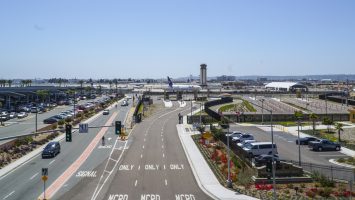
Delta Airlines, the Georgia Institute of Technology, and Curiosity Lab are partnering to research potential applications for autonomous vehicles at airports in a bid to increase efficiencies and reduce the stresses of travel. Delta will contribute seed funding for the research project, and researchers from all three partners will be able to use Curiosity Lab’s 1.5-mile ( ~2.4 km) autonomous vehicle test track and smart city living laboratory in Peachtree Corners, Georgia.
“Driving the leading edge of emerging technology – like we’ve done with biometrics by launching the first fully biometric terminal in the United States – means Delta can help shape how industry adopts it,” said Gil West, chief operating officer at Delta. “Autonomous vehicle technology is one of those innovations we see as having the potential to improve employee safety, the customer experience and operational performance, and this partnership will help us explore all of those possibilities.”
Curiosity Lab – a 5G-enabled, autonomous vehicle and smart city living laboratory – is owned by the city, and includes a smart infrastructure featuring connected traffic lights, a dedicated fiber-optic data network, and an operations center where researchers can track data from all the connected devices and sensors on the track.
“Our 5G-enabled living laboratory will give Georgia Tech researchers the opportunity to push the frontier of emerging technology in a real-world setting that is almost impossible to replicate in a closed lab,” said Betsy Plattenburg, executive director of Curiosity Lab at Peachtree Corners. “Curiosity Lab also will provide those researchers an opportunity to collaborate with other industry leaders and focus their research on immediate challenges and results.”
The collaboration is part of Georgia Tech’s autonomous mobility and infrastructure work, which includes the Georgia Tech Research Institute, the School of Civil and Environmental Engineering, the Institute for Robotics and Intelligent Machines, the Office of Parking and Transportation Services, and Smart Cities and Inclusive Innovation.
Debra Lam, managing director for smart cities and inclusive innovation at Georgia Tech, said, “This is a wonderful example of industry-university-local government coming together to advance innovative solutions to the built environment and mobility. Providing access to more than $4 million in infrastructure will help our researchers test new technologies and further our mission of serving our community through innovation. Providing access to such infrastructure will help our researchers test new technologies and further our mission of serving our community through innovation.”


